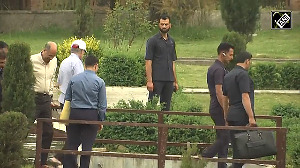'...an hour before he was hanged from the film Badal, 'Apne liye jiye toh kya jiye'...
'I saw eight hangings -- Ranga and Billa, Maqbool Bhat, Kartar Singh and Ujagar Singh (Dr N S Jain murder case), Satwant Singh and Kehar Singh (Indira Gandhi assassination case) and Afzal Guru.'

His warm and genial greeting over the phone belies the job he was in for decades -- assistant superintendent of police (ASP) in the dreaded Tihar Jail.
Sunil Kumar Gupta's 2019 book, Black Warrant: Confessions of a Tihar Jailer, has been converted into a Netflix series successfully and is directed by Vikramaditya Motwane and Satyanshu Singh.
He is now an advocate in the Supreme Court and Delhi high court and has written two other books -- one on prisons laws and another on the rights of prisoners.
Gupta has many firsts to his credit. He was instrumental in framing the Delhi Prison Act and Manual, and initiated jail adalats in collaboration with the judiciary in the jail complex itself.
In 1983, he helped start the first Legal Aid Cell inside Tihar Jail for prisoners.
While basking in the afterglow of the series' success, Gupta tells Rediff.com Senior Contributor Shobha John that the job of a jailer is akin to slavery as most have to kowtow to their masters.
- Part 1 of the Interview: 'Murderers Are The Most Reliable People'
Have criminals today become more high-tech as compared to earlier?
Yes, they have, as cyber crimes are on the rise.
Which category of criminals is among the worst and can't be reformed?
Ninety percent of criminals can be reformed. The fact that only 12 escaped with Sobhraj from Jail No 3 which had 1,200 prisoners is revealing.
The gate of the jail was open and the others could have escaped, but they didn't.
These are among the 90% who can be reformed. Those who can't be reformed are the ones with multiple cases against them in various states. Terrorists fall in this category.
Which prisoner impressed you the most and why?
There were two life convicts called Dhumi and Charanjeet. We were trained in jail matters by them as we were not given any formal training.
Prisons are often the last priority for any state government.
I had helped draft the Delhi Prison Act and Jail Manual where it was stated that it was compulsory to train prison staff, but till date nothing has happened.
Prisons are sometimes seen as punishment postings, so what type of reformation can be done by those sent there?
The United Nations Standard Minimum Rules for the Treatment of Prisoners (the Nelson Mandela Rules) states that prisons should be run by professionals.
Most countries have Prison Services and staff is taken from there to run jails.
Singapore even has the Yellow Ribbon Singapore programme where reformed prisoners are given jobs. Its Web site says that 95% of inmates referred to it secured employment prior to release.
In India, Kiran Bedi's tenure as Inspector General of Delhi Prisons was exceptional as she institutionalised reforms in jails and started many programmes for prisoners.

How many hangings did you witness? Did they leave a lasting impact on you?
I saw eight hangings -- Ranga and Billa, Maqbool Bhat, Kartar Singh and Ujagar Singh (Dr N S Jain murder case), Satwant Singh and Kehar Singh (Indira Gandhi assassination case) and Afzal Guru.
As I was a soft person, I used to cry when some of them were hanged.
I remember Afzal Guru even sang a song an hour before he was hanged from the film Badal, 'Apne liye jiye toh kya jiye'...
Sometimes remission given to certain convicts is controversial.
That is true. As per the jail manual, the minister handling jails heads the remission review board. That says it all.
Has the criminal justice system become better? Pendency in courts is still high and undertrials form a major portion of prisoners in jail.
The criminal justice system is obsolete. We should have laws framed in such a manner that there is a time limit to decide each case as is done abroad, the reason for the delay and compensation for the victim and the accused in such cases.
We need this 'surgery'. Even though the number of judges has increased, pendency has also increased.
In 1981, the ratio of convicts to undertrials was 45: 55 in Indian jails.
The Supreme Court has time and again said that this should be reduced.
But in December 2022, the ratio of convicts to undertrials increased to 26:74.
We need more accountability from all those who are part of the criminal justice system.
It is a fact that wherever the law talks of compensation, it is effective.

As a jailer, was your family scared for you? Has anyone from your family followed in your footsteps?
Yes, of course. I used to stay inside the Tihar complex and all that separated my house from the prisoners was a wall, so my family did feel scared.
No, I don't want anyone from my family to join the prison system as it is a life of slavery.
One has to be a slave to the masters. Later on, I became a legal adviser in Tihar and after retirement, I became an advocate.
I heard you are planning to write another book. What will it be on?
Yes, I am. It will be on prison escapes and it should be out this year. The most daring one, in my opinion, was that of Charles Sobhraj.
Feature Presentation: Aslam Hunani/Rediff.com










